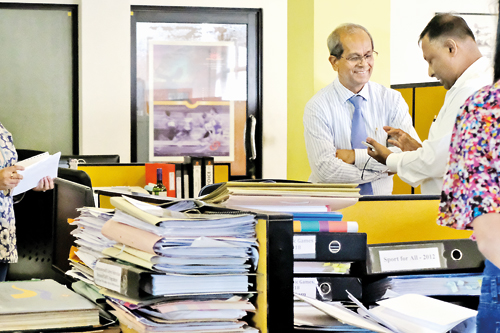No VIP status for NOC – Sports Ministry
View(s):
NOC claims that it is not a Government Department to come under the Auditor General, but the MoS clearly states that it is not the case
The Sports Ministry has made it mandatory for the National Olympic Committee of Sri Lanka (NOCSL) to audit their annual accounts through the government auditor–the Auditor General’s Department–Minister of Sport Harin Fernando said on Thursday.
The decision comes in the wake of NOCSL’s attempt to gain complete independence and autonomy claiming non-Government organization (NGO) status with no links whatsoever with the Government.
The auditing of accounts by Government auditors is a mandatory requirement under the Sports Law for all national sports associations and all committees including the NOCSL but has often been resisted by the NOCSL.
Although this has often caused delays in holding annual general meetings, given the workload of the auditors, it is a useful check-and-balance in governance of these largely corrupt institutions.
“Just as any other sports association in the country, they must audit their accounts through the government auditors,” Minister Fernando said responding to questions.
Recently, writing directly to the Attorney General’s Department, the NOCSL requested exemption from audit by Government auditors, causing consternation among the sports fraternity.
They also wanted amendments to the Sports Law and regulations enacted therein to ensure complete independence and autonomy citing International Olympic Committee (IOC) requirements.
Their letter was after a‘Special Audit Report on Sports in Sri Lanka and its Administration’ dated May 21, 2018, recommended legal action against those who violated the Sports Law by failing to follow government financial regulations, Government procurement guidelines and Government administrative regulations.
Maxwell De Silva, the Secretary General of the NOCSL says that the assertion of the Auditor General is inherently wrong as the NOC Sri Lanka is not a Government department or entity relying on funds provided through the consolidated fund voted for by Parliament.
“The approach of the Auditor General is completely wrong as following the directives issued by the Auditor General can have drastic implications on the independence and/or autonomy of the NOC Sri Lanka, which can attract penal sanctions of the IOC, which insists that NOCs should be independent and autonomous, free from all forms of government interferences and/or meddling”, de Silva wrote in his letter. It is copied to the Prime Minister, Sports Minister, Secretary to the Ministry of Sports, and two others from the IOC and the Asian Olympic Council.
This statement is far from the truth. While the NOCSL receives sufficient funds to manage most of its activities, including day-to-day expenditure, from the global body, it also consumes a considerable amount of tax payers’ money. The Ministry of Sports provides monies allocated by the Treasury to enable the NOCSL to sponsor athletes to represent Sri Lanka at numerous Games organized with IOC collaboration. This includes the Olympic Games, Commonwealth Games and the Asian Games. These require a proper auditing by the Government auditors.
This request for exemption from Government auditing comes at a time when an amount of Rs. 100 million is being proposed in the 2019 State budget as an allocation to the NOCSL.
However the proposal has now been shot down at the request of the Ministry of Sports. Never in the history of Sri Lanka has the Government allocated funds directly to the NOCSL, which falls under the Ministry of Sports.
The proposal took the Sports Ministry by surprise and caused concern among many who are aware of the lack of accountability and transparency in the Olympic Committee during the past several years.
In a letter addressed to the Minister of Finance, Co-Cabinet Minister in charge of Sports Harin Fernando has vehemently opposed the move citing that it’s against financial regulations.
“I was also surprised as to how the money was allocated to the NOCSL through the budget but we have managed to stop that,” said the Minister responding to a query by the Sunday Times.
Though the Olympic Charter requires NOCs to preserve their autonomy and resist all pressures of any kind–including, but not limited to, political, legal, religious or economic pressures which may prevent them from complying with the Olympic Charter–it also requires member associations to operate in accordance with both the rules of the Olympic Movement and the laws of the land.


